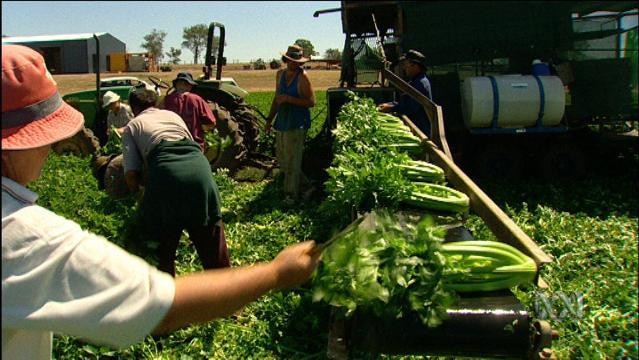NICK HARDCASTLE:
Without our little, green plant friends here, we just couldn't exist. If they disappeared tomorrow, the world would come to a grinding halt. Plants are used in every aspect of our world every single day. And knowing how they can be useful is very important. Breathtaking, isn't it? When the first settlers arrived in Australia from England in 1788, they brought with them everything they thought they'd need, including all the plants and veggies from back home. But, unfortunately, the conditions and the soils were so different to what they were used to, the crops failed and they almost starved. Meanwhile, the Aboriginal people had been living successfully off the same land, the difference being that they knew their native plants. They'd built up a knowledge of the plants surrounding them, like these Warrigal greens, and it was this plant knowhow that helped them to survive. Throughout history we've been using the stems of the largest of all plants — trees. The stems — wood — is a great building material. It can be cut to shape and is light and strong enough to build ships to explore the world or to construct houses for shelter. It can be processed to make paper and even burned to keep us nice and warm and cosy. And speaking of keeping warm, without plants, what would we wear? Well, forget T-shirts and jeans, because cotton comes from a cotton plant. And no woolly socks, because sheep feed on grass. And no gumboots, because rubber comes from a rubber tree. So, good old plastic bags. 'Cause plastic's got nothing to do with plants, right? Plastic? No. No, plastic comes from oil, doesn't it? (Gasps) Oil is what's left of ancient dead plant material that's been compressed over millions of years. We make plastic from that oil. In fact, the petrol for our cars comes from this oil as well. Our whole planet runs on out-of-date, squashed plant juice. Many important medicines are drawn from plants. Herbs have always helped cure sickness, the willow tree gives us aspirin, penicillin mould helps us fight infections and extracts from the opium poppy help us control pain. But wait, there's more. We haven't even looked at food yet. We eat an incredible range of plant parts — leaves, roots, stems, flowers, seeds, fruits — and we make all kinds of different foods using plants from all over the world. Now, this may come as a bit of shock to you, but food doesn't originally come from the supermarket. Oh, sure you buy it there, but, no, it's planted, grown and harvested on farms and in gardens. And without the knowledge that these farmers and gardeners have of the plants they grow and how to grow them, you and I could go very hungry. Well, we've proved that plants are useful, but, apart from helping us to survive, they're also very beautiful. And great for making things. And I've got Jack and Emily here. What have you been doing?
EMILY:
We've collected leaves and petals from the ground in the garden.
NICK HARDCASTLE:
Well, OK. And what are you gonna do with them?
JACK:
We're gonna put them on this waxing paper and then we're gonna make wrapping paper.
NICK HARDCASTLE:
Oh! Wrapping paper. Is that for my birthday present?
EMILY:
No.
JACK:
You wish. We've placed a piece of wax kitchen paper down, waxy side up.
EMILY:
Next you place your petals and leaves in a pattern on the paper.
JACK:
Then put another piece of waxy paper the same size, waxy side down, on top.
NICK HARDCASTLE:
OK. This is my bit. Get an adult to help you here 'cause irons are hot.
EMILY:
Question — do you normally iron?
NICK HARDCASTLE:
Uh, no.
EMILY:
I'm doomed.
NICK HARDCASTLE:
Press the paper with the iron to seal in the leaves and petals, and voila. Wow, what great patterns. And the colours are fantastic, and they'll last for ages. When you use the iron, don't use steam because you'll just make a mess. Now, they do make good gift-wrap, but, since you're not wrapping up my birthday present, what are you doing?
EMILY:
I'm covering my favourite book.
NICK HARDCASTLE:
OK.
JACK:
And I'm gonna wrap someone else's present.
NICK HARDCASTLE:
Ouch! Well, anyway, it does prove that the uses of plants are only limited by your creativity… and your stingy friends.
